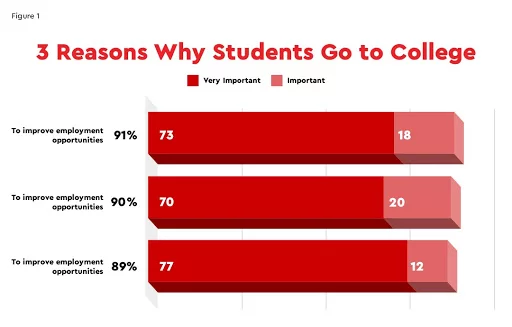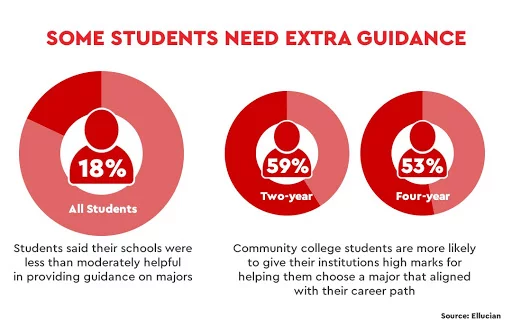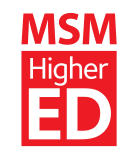
The role of higher education institutions in career guidance and support
A student’s career path starts early with his experiences and influences at home and ends with him working his dream job. Or at least, that’s what most college students want to achieve when they enroll in their selected program.
Key points at a glance
When choosing a major, 22 percent of students revealed that their families played an important role when influencing them, based on a New America survey..
Twenty one percent of students revealed that “personally rewarding careers” motivated them on what major to choose.
From 1940 to 2010, college completion increased 400 percent. Because of this trend, more graduates are underemployed.
It is highly recommended that incoming freshmen visit a career counselling center before anything else
Most of these students already have an end in mind. In fact, according to a New America survey, they already have a goal and that is to improve their financial standing through earning a degree and then joining the workforce.

However, having a goal is different from actually knowing what steps to take to achieve it. Unfortunately, most of these students do not have a clear plan ahead of them. Some enter college thinking that taking up a major of their choice and earning a degree will automatically land them a lucrative job.
“Students are most influenced by family when choosing a major; 22 percent chose family as the most important factor influencing their choice of major. However, 21 percent of the students chose ‘a career that is personally rewarding,’” stated the results of a survey in a research paper published by The University of Tennessee, Martin.
The intentions are well but the numbers don’t lie. In Ireland, an old news report reported a quote stating one of the reasons behind the country’s spike in college dropout rates. “The Institute of Guidance Counsellors said it should not be a surprise to find poor rates in many universities when the provision of guidance was so poor.
It is unfortunate then, that the common scenario would be that some students would choose their programs or courses—themselves lacking in substantial information—then either drift away or entirely lose course of their goals. Worse, some students who failed to gauge their own academic preparedness from the start choose to drop out of college and regret picking the wrong major or school altogether.
This is where healthy career guidance services in higher education institutions come in. In fact, career guidance should play a more major role in higher education. Career counseling for college students is essential in introducing, guiding, and motivating students for them to rank high in their chances of employability, thus helping them land their dream careers. This is most especially helpful for international students as well, who might need more help understanding the new culture they are experiencing for the first time (if they plan to work in their host country).

With students driven by their own goals and influenced by their families on how to achieve them, higher education institutions enter as true, unbiased educators, guiding students on what exact steps to take for them to achieve their desired outcome.
What is career guidance? How important is it?
According to the Office of Career, Technical, and Adult Education of the United States Department of Education, a career guidance and counseling program is “a comprehensive, developmental program designed to assist individuals in making and implementing informed educational and occupational choices.”
While career choices may become an afterthought during one’s higher education journey (most especially for international students who are enamored by new life experiences), it is important for students to recognize the importance of consistently utilizing and seeking out career services in college. And schools need to deliver, too.
A Swedish Higher Education Ordinance reiterated: “Students must have access to study counsellors and career guidance… The content of these services differ, but the goal is the same: to support students at the time of graduation as they prepare to enter the labour market,” read the policy.
Looking at the matter from a real-world application, the recommendations of a study which focused on how higher education fared as a predictor of employment, stated that “career guidance and services” inside institutions “must be provided” to save students from wasting their time after graduation searching for a job.
However, times have changed. Career counseling for college students can now be seen as a way for students to strategically position themselves in the employment market. Why? There have been more and more graduates each year, while job demand relatively stayed the same. Between 1910 and 2000, employment in the United States grew from 1.7 million to 30.2 million, according to the Bureau of Labor Statistics. From 1940 to 2010, college completion increased 400 percent. The result? A Washington Post article states that 40 percent of graduates are underemployed. Merriam-Webster defines unemployment as “the condition in which people in a labor force are employed at less than full-time or regular jobs or at jobs inadequate with respect to their training or economic needs.”
Under traditional and modern circumstances surrounding the employability and careers of college students, the importance of career guidance and counselling cannot be stressed enough.
Career guidance concerns, higher education institutions’ role
Career guidance and counselling is a matter affecting the global education market. In China, a university study looked into the country’s progress with career guidance and how it could improve even if it “started late.” The study also enumerated a few problems China encountered with career guidance, which higher education institutions anywhere around the world might be familiar with. Here are some of the common concerns along with recommendations:
Start early. According to the researchers, the concept of career development should be “explicitly” presented to students “early in their university lives.” Students and educational institutions have to recognize the importance of what career planning does for students’ lives and careers. Even higher education institutions stand to benefit from this, as proper career guidance leads to higher employment success rates for their students.
Be more proactive. A big problem attached with career counseling for college students is that often, students feel like it is just an optional thing to consider only when they need help on deciding about a career. It is also a problem when the importance of career services in college are undermined by institution decision-makers, and thus, the quality of service offered by counsellors and their offices are degraded. Sometimes, these services do not have a “career plan” from Year 1 to until employment for their students, and just operate on an ad hoc basis. Institutions should consider re-evaluating their career guidance and counselling services.
Address a student’s needs personally. While some higher education institutions do have career plans in place, sometimes—and this is often a concern even with education delivery itself—students’ needs have to be addressed individually. This will take time, effort, and resources, but society expects nothing less from its esteemed educational institutions. These students will make part of the future workforce that will give back to their communities in their own ways.
The need for more skilled, career guidance professionals. The study’s researchers said: “Another problem stems from the fact that the number of career guidance professionals currently available is not enough to meet actual demands. Also, among the personnel available, quality is often lacking.” This circles back to the fact that higher education institutions have to highlight the importance of career services in college for students, faculty, society, and businesses in the community.
Conclusion
Institutions need to guide students on what major fits them best, accompany them through the whole process making sure they stay the course, and finally, see them through the end helping them gain the knowledge and experience necessary for them to start their careers immediately after graduation. Natalia Orellana of the Organization for Higher Education, Co-operation, Research and Development highlighted this trend in an article, saying that institutions working “towards aligning higher education with the needs of the working world” have received “considerable attention.”
Colleges and universities can also empower their students through career counselling
Services. These could move them to act responsibly when career-related concerns arise during the course of their entire program or course.
Higher education institutions should make career development initiatives like career counseling or career guidance for college students, among others, available from start to end, and open for anybody. In fact, before attending any higher education recruitment, it is highly recommended that incoming freshmen visit a career counseling center before anything else. This will help in the setting of expectations, among others.
By promoting career planning as a significant part of the higher education experience, higher education institutions will guide individuals in achieving short-term goals as students in the present, while simultaneously preparing them for their long-term career goals in the future, contributing to society.
Read more:
Data sources:
Fishman, R. (2015, May) 2015 College Decisions Survey: Part I. New America. Retrieved from https://d1y8sb8igg2f8e.cloudfront.net/documents/deciding-to-go-to-college.pdf
Fizer, D. (2013, December) Factors Affecting Career Choices of College Students Enrolled in Agriculture. The University of Tennessee, Martin. Retrieved from https://www.utm.edu/departments/msanr/_pdfs/Fizer_Research_Project_Final.pdf
Oliver, E. (2001, February 28) Lack of career guidance blamed for dropout rate. The Irish Times. Retrieved from https://www.irishtimes.com/news/lack-of-career-guidance-blamed-for-dropout-rate-1.285530
Velez, E. (2014, January) America’s College Drop-Out Epidemic: Understanding the College Drop-Out Population. National Center for Analysis of Longitudinal Data in Education Research. Retrieved from https://caldercenter.org/sites/default/files/WP-109-Final.pdf
Course correction: Helping students find and follow a path to success (2019) Ellucian. Retrieved from https://www.ellucian.com/assets/en/2019-student-success-survey-results.pdf
Career Guidance and Counseling Programs (2014, June 18) Office of Career, Technical, and Adult Education. Retrieved from https://www2.ed.gov/about/offices/list/ovae/pi/cte/cgcp.html
Guidance and Counselling in Higher Education (2018, August 10) European Commission. Retrieved from https://eacea.ec.europa.eu/national-policies/eurydice/content/guidance-and-counselling-higher-education-71_en
Ali, M. (2018, August) Higher Education as a Predictor of Employment: The World of Work Perspective. Education Resources Information Center. Retrieved from https://files.eric.ed.gov/fulltext/EJ1209685.pdf
Wyatt, I. (2016, March) Occupational changes during the 20th century. Bureau of Labor Statistics. Retrieved from https://www.bls.gov/mlr/2006/03/art3full.pdf
Selling, J. (2018, September 1) College students say they want a degree for a job. Are they getting what they want?. Washington Post. Retrieved from https://www.washingtonpost.com/news/grade-point/wp/2018/09/01/college-students-say-they-want-a-degree-for-a-job-are-they-getting-what-they-want/
Sun V. (2012, April 1) Career Guidance and Counseling for University Students in China. International Journal for the Advancement of Counselling. Retrieved from https://link.springer.com/article/10.1007/s10447-012-9151-y
Orellana, N. (2018, May 30) Extending the Scope: Career Guidance in Higher Education. Global University Network for Innovation. Retrieved from http://www.guninetwork.org/articles/extending-scope-career-guidance-higher-education
Crisan, C. (2015, May) A Need Assessment on Students’ Career Guidance. Procedia – Social and Behavioral Sciences. Retrieved from https://www.researchgate.net/publication/277948106_A_Need_Assessment_on_Students’_Career_Guidance
What is Career Counseling?. Boise State University. Retrieved from https://www.boisestate.edu/career/what-is-career-counseling/

